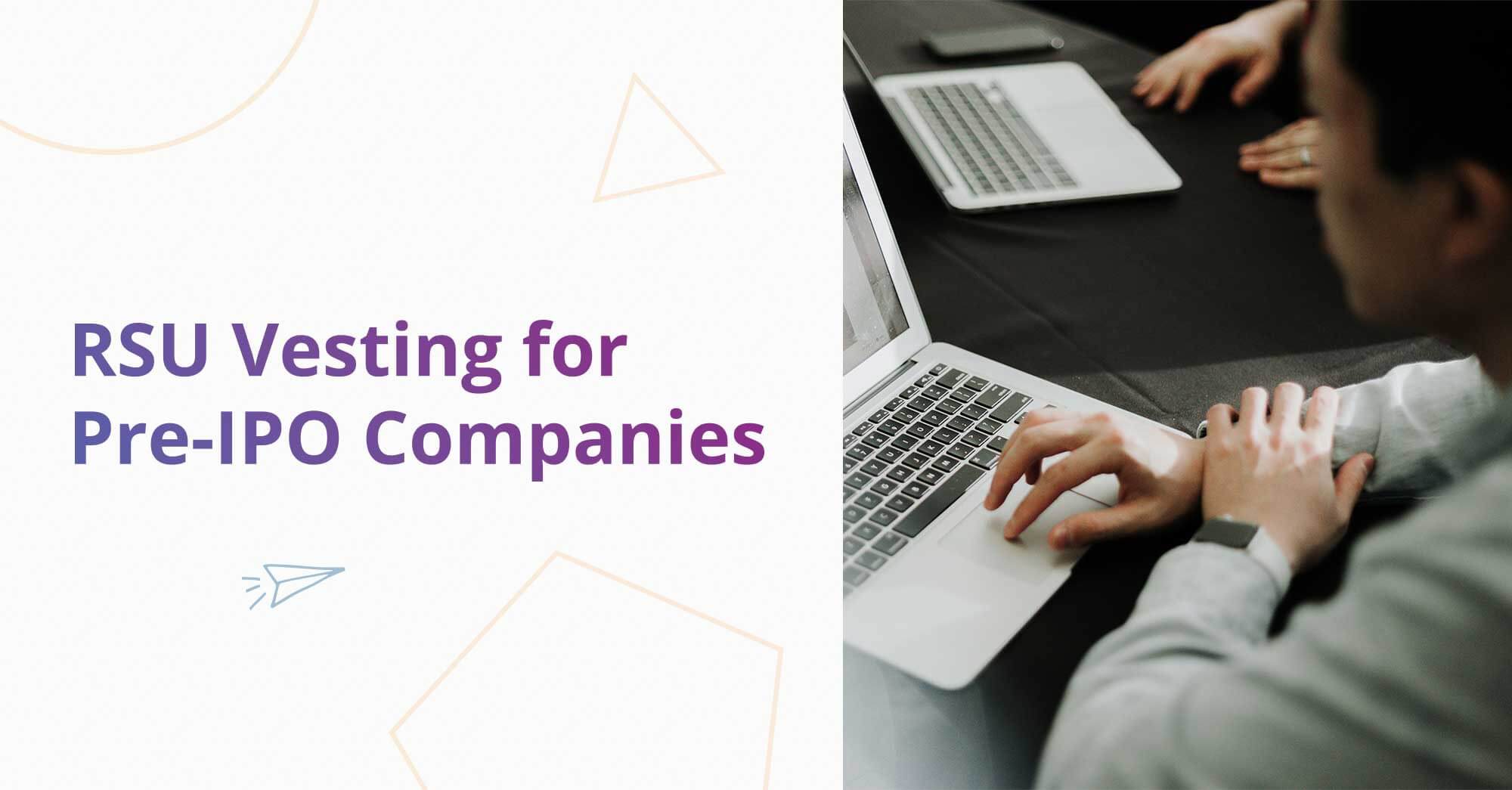Restrictive stock units (RSUs) are a form of equity compensation which is granted to employees in both pre-IPO and public companies. RSUs represent a promise to issue shares of company stock to an employee at a future date, subject to certain vesting conditions.
In pre-IPO companies, RSU vesting typically refers to the process by which employees gain ownership of the granted RSUs over time. The specific terms of RSU vesting can vary from company to company
Why should you care about RSU vesting?
While you may not have control over the taxation of RSU vesting, being informed and proactive about tax planning and compliance can help you optimize your financial outcomes.
RSU vesting usually triggers taxable events. When your RSUs vest and convert into shares, you may owe taxes on the value of the shares at that time. The specific tax treatment depends on numerous factors, such as your country’s tax laws and the type of RSU plan.
Taxes owed on RSU vesting can impact your cash flow. It is essential to be aware of the potential tax liability and plan accordingly to ensure you have the necessary funds available to cover tax obligations. Failing to plan for taxes can lead to unexpected financial burdens.
RSUs can have a significant impact on your long-term financial well-being. Understanding the tax implications helps you assess the net value of your RSUs after taxes and makes informed decisions about how to utilize or invest the proceeds. It also allows you to align your RSU vesting strategy with your broader financial goals, such as saving for retirement, funding education, or purchasing a home.
Typical Vesting Schedule for RSUs
Vesting schedules are often time-based, you usually are required to work at the company for a certain period before vesting can occur.
An example of this would be you can be granted 5,000 RSUs. Your graded vesting schedule spans four years, and 25 per cent of the grant vests each year. On the first anniversary of your grant date and on the same date over the subsequent three years, 1,250 shares vest. Once each portion vests, you can sell the shares.
The example above uses a “graded” vesting schedule, the vesting of the grant in serial portions. Vesting schedules can also have “cliff” vesting, in which 100% of the grant vests all at once after you have completed a stated service period. The vesting schedule can also (or instead) be performance-based, e.g., tied to company-specific or stock-market targets.
Most graded-vesting grants have restrictions that lapse over three to five years. In addition to providing for regular vesting, a graded vesting schedule may, alternatively, have varying intervals between vesting dates:
Example: You are granted 20,000 RSUs. One year after the grant date, 25% of the shares vest (5,000). The remainder (15,000) vest every month (625 a month) over the next two years.
At newly public companies, grants made before the initial public offering (IPO) may also require a liquidity event (i.e., the IPO itself) to occur before the shares vest. Once a liquidity event has occurred, the shares vest 180 days (about 6 months) later.
Job termination always stops vesting. The only exception occurs in certain situations when vesting may be allowed to continue or may even be accelerated (e.g., death, disability, or retirement, depending on your plan and grant agreement).
Vesting requirement for RSUs
Single trigger vesting for RSU (RUS)
For investors and companies involved in the M&A deal, there are no major benefits for a single trigger acceleration.
The main benefits lie with the employee as it gives them a substantial stock pay-out and the flexibility to leave at the point of acquisition if they wish to do so, as well as no ties to the company in the form of vested stock.
However, this type of acceleration is common with strategic partners and board members that have come in to assist in the M&A lifecycle as this aligns their incentives with the end goal, or the successful completion of a deal.
Investors tend to avoid deals with single trigger acceleration as the risk of large numbers of employees leaving post-acquisition is high. There is also a need for the new company to re-negotiate high quality benefits plans that will entice key employees to stay with the company if their vested stock has paid out in full.
The additional cost of either new employee acquisition or a comprehensive and competitive benefits plan is often the cause of a reduction in purchasing price or increasing the post-deal closing cost, which is already a tricky field to negotiate, both financially and in terms of employee relations.
Single trigger acceleration often has a greater impact on employee retention, as the benefits and any future vested stock must be re-negotiated after a pay-out. If fully vested, the employee no longer has ties with the company, and they may.
Double trigger vesting for RSU (RUS)
By negotiating double trigger acceleration with core employees, acquirers are less at risk of losing key, influential personnel upon deal completion.
For the employee, it guarantees more protection as the cost of paying out stocks and shares to all employees immediately will be high. There is potential for greater job security.
The real benefit to double trigger acceleration lies more with the investors or acquirers than it does with employees who wish to leave the company, but do not want to lose their vested shares.
For an employee, they may lose their accelerated vested shares if they are terminated before a deal goes through, or if the “change of control” ends up falling through. This can cause dissatisfaction in key employees, and ensuring you have adequate HR consultants on hand to oversee the completion of a deal is key. You can limit disappointment by ensuring the successful delivery of an M&A.
There are also many negotiations and specific clauses that must be attached to ensure any potential loopholes are avoided. This might include intentional performance issues to access vested stock early.
Double trigger is often better for employee retention, as the two requiring clauses cannot be completed individually and instead both must be met. If only one is completed, then the employee retains their stock options and is still invested in the success of a deal.
It is important to negotiate this correctly, as involuntary termination years after the deal can result in greater pay-outs. If no sundown clause has been put in place, a larger vested stock or share pay-out may be inevitable.
Watch your lock-up period
A lock-up period is a restriction imposed on company insiders, such as employees, founders, and early investors, preventing them from selling their shares immediately after an initial public offering.
The purpose of the lock-up period is to maintain stability in the stock price and prevent a flood of shares from hitting the market, which could potentially lead to a rapid decline in the stock’s value.
Once the lock-up period ends, the insiders are free to sell their shares in the open market if they choose to do so. The expiration of the lock-up period may result in increased selling pressure, as insiders who wish to liquidate their holding can now freely participate in the market.
The overall purpose of the lock-up period is to provide stability and give investors’ confidence in the newly public company. By limiting the supply of shares in the market during the initial period, the company aims to prevent a sudden decline in share prices, allowing the market to adjust to the new stock gradually.
Please Note: This publication contains general information only and J.P. Morgan Workplace Solutions is not, through this article, issuing any advice, be it legal, financial, tax-related, business-related, professional or other. J.P. Morgan Workplace Solutions’ Insights is not a substitute for professional advice and should not be used as such. J.P. Morgan Workplace Solutions does not assume any liability for reliance on the information provided herein.



